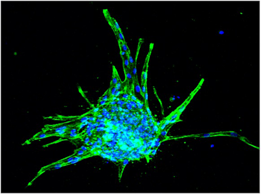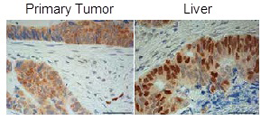Projects
Vascular and tumor biology laboratory
We are interested in the molecular mechanisms of cell differentiation and how their deregulation contributes to human diseases, such as cancer and vascular disorders. Our research is focused on key transcription factors that we and others have shown to be important for the development of functional lymphatic vascular system, such as FOXC2, or for colon cancer stem cells, such as PROX1.
Our main projects in the lab are the following.
Mechanisms and novel effectors of (lymph)angiogenesis in development and disease
Amelie Sabine, Esther Bovay, Borja Luri Prat, Stefanie Hendrikx

Picture cortesy of Dr. Amelie Sabine
Lymphatic vasculature is increasingly recognized as a key player in the maintenance of normal fluid balance and immunity. It is also important in many common human diseases, such as cancer and chronic inflammatory conditions.
Our aim is to identify central regulators of lymphatic vascular development and to study the impact of lymphatic vascular dysfunction on immunity and cancer (Schulte-Merker et al., 2011, Norrmen et al., J. Cell. Biol. 2009). We employ tissue-specific inducible genetic animal models, ex vivo characterization of endothelial cells and analyses of patient samples.
Mechanical forces in lymphatic vascular patterning and function
Cansaran Saygili, Amelie Sabine, Esther Bovay
In addition to chemical gradients of growth factors and cytokines, vessels are continuously subjected to a variety of mechanical forces, such as shear stress, pressure and stretch. To date little is known how such mechanical forces contribute to development and function of lymphatic vasculature.
Using a combination of in vitro modeling and analyses of genetic models, we recently established that disturbed flow plays a key role both in the development of lymphatic valves, essential for directing lymph flow, and in stabilization of postnatal lymphatic vessels (Sabine et al., Dev Cell, 2012, Sabine et al., J. Clin. Invest., 2015).
Further goals of this project is to identify principal molecular effectors of mechanosignaling in lymphatic endothelium, to study how such signaling affects lymphangiogenic or vascular maturation responses and to use this knowledge to propose potential therapeutic approaches for modulation of vascular function.
Organ-/cancer-specific vasculature and its cross-talk with stem cells
Jeremiah Bernier-Latmani, Simone Ragusa, Alejandra Gonzalez, Christophe Cisarovky

Picture courtesy of Dr Jeremiah Bernier-Latmani

Blood-and-brain barrier and liver sinusoidal vasculature are examples of highly specialized vascular beds. Such specialization is essential for the normal organ function, for example to restrict the diffusion of certain components of blood to cerebrospinal fluid, and it is frequently affected in pathological conditions. However, with a notable exception of blood-and-brain barrier, our knowledge of the mechanisms underlying organ-specific vascular specialization and its role in human diseases is rather fragmentary. Even less is known about how such specialization affects the formation of primary or metastatic tumors, and whether it contributes to the maintenance of cancer stem cells.
Using normal intestine and colon cancer as models (Petrova et al., Cancer Cell, 2008, Ragusa et al., Cell Rep., 2014), we study vascular specialization and stromal regulation of tissue- and cancer-specific stem cells. In this project we utilize genetic and xenograft models of colon cancer, coupled with analyses of stromal and cancer cell transcriptomes and proteomes, analyses of intestinal organoids and large scale characterization of human colon cancer tumors.
Our final goal is to define the potential new strategies for targeting stromal and stem cells in colon cancer.



